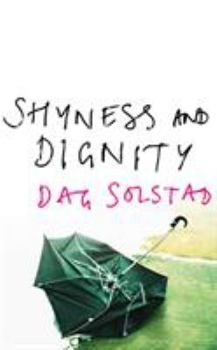Shyness and Dignity
Select Format
Select Condition 
Book Overview
Nothing in Elias' measured life, in his whole career as a teacher of literature, in his marriage to the 'indescribably beautiful' Eva, foreshadowed the events of that apparently ordinary day. He makes sure he has his headache pills and leaves for work as he has done every morning for the past twenty-five years.
Format:Paperback
Language:English
ISBN:1843432102
ISBN13:9781843432104
Release Date:July 2006
Publisher:Harvill Press
Length:176 Pages
Weight:0.45 lbs.
Dimensions:0.3" x 5.3" x 8.5"
Customer Reviews
2 ratings
The Unbearable Lightness of Being
Published by Thriftbooks.com User , 14 years ago
Shyness and Dignity, the first of Dag Solstad's some thirty literary works to be translated into English, is a worthy introduction of this thrice-time winner of the Norwegian Literary Critics' Award to an English-speaking readership. The novel, first published in 1994, tells the tale of a "sottish Senior Master", named Elias Rukla, who teaches high school literature in Norway's capital of Oslo. The novel presents the climactic self-implosion of the Senior Master, when he verbally lashes out at an unsuspecting female student, in the novel's opening pages. In the remaining one hundred and forty pages of the novel, Solstad slowly unveils the intricate patchwork, the many, complicated layers of onion that is Rukla's past, and which all together lead up to his self-destructive tantrum. Shyness and Dignity contains little dialogue, and is concerned mostly with the inner dialogue of its protagonist, Rukla. In his exposition-heavy prose, Solstad makes effective use of repetition- repeating words and phrases like a guitarist improvising version after version of a baseline riff. This repetition lends a musical quality to Solstad's narrative; it guides the reader along, and gives the narrative the momentum it needs in the absence of more dialogue. To give the narrative much of its depth, Solstad inserts competing, probing questions into the narrative, and which exist in the mind of Rukla. These questions also serve to make Rukla more human, as we recognize that slowing Rukla down are many of the same questions that confront us all. Slowly, as the narrative progresses, the reader becomes arrested within the mind of the novel's perplexed protagonist. We are never afforded the luxury of looking back at Rukla. The reader feels Rukla's "estrangement" along with him. As Rukla begins the recollect his past, we first follow Elias back in time to his days as a student, when he befriended a magnanimous and eccentric philosopher and fellow student named Johann Corneliussen. As young students in the 1970s, the two would engage in all night drinking binges that would linger late into the night and be imbued with lively, challenging philosophical debate. It is through Corneliussen that Rukla eventually meets Eva Linde, his future wife. But Eva was first married to Corneliussen. But when Corneliussen abandons Eva and their daughter to unexpectedly pursue a career in marketing in Manhattan (forgoing his ambition to be a contributor to the timeless dialogue between scholars of Immanuel Kant), Eva moves in with Rukla. The two eventually marry. Their relationship is far from healthy, and only serves to accentuate Rukla's isolation. Eva and Elias lived what Elias felt was a tempered domestic life, in which they both sacrificed personal ambitions. The two "moved past each other in separate orbits", and were unable to bridge the lexical gaps that existed between them in order to express their love for one another. From Elias' perspective, it was that Eva who
Dag Shames American Authors
Published by Thriftbooks.com User , 17 years ago
Shyness & Dignity reminded me of several of my favorite authors: Saul Bellow, especially "Seize the Day," with its portrayal of an irrevocable moment of existential dread, Samuel Beckett for its painstaking examination of the world in so absurdly rational a way as to bring rationality into question, and Knut Hamsun, especially Hunger, in its presentation of consciousness, so vivid that it can be said that consciousness itself is the hero. It's a novel so fresh and real that it puts the pallid exercises of contemporary American academic "authors" to shame. Let's hope more Dag Solstad gets published!





